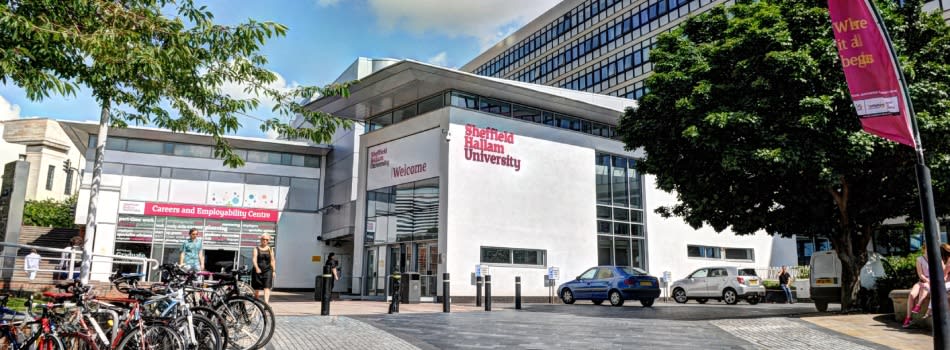Dr A Ali, Dr N Haynes, Dr Elspeth Frew
No more applications being accepted
Competition Funded PhD Project (Students Worldwide)
About the Project
Sheffield Hallam University is inviting applications for this PhD project in our Sheffield Business School. The project is part of our joint PhD programme with La Trobe University, Melbourne, Australia. Students on the joint PhD programme will be enrolled on a PhD at both institutions, with a supervisory team of academics from each institution. On successful completion, the candidate will be awarded a PhD jointly by both institutions.
This project is based at Sheffield Hallam, with an expectation that the successful candidate will spend up to 12 months at La Trobe during the second/ third years.
Traditionally the view of the hotel manager’s role was to act as “Mein Host”, suggesting the need for a physical presence in the hotel. However, the rise of remote working, driven by mobile technologies and more recently by the COVID-19 pandemic, is causing a shift in expectations and realities of where hotel general managers are expected to conduct their “work”. Recent research in the UK confirmed that hotel managers are increasingly making pricing decisions from home or even on holiday due to the integration of mobile devices with revenue and finance systems (Egan & Haynes, 2019). Consequently, financial decision-making is increasingly taking place in the context of a fluid location often set apart from the physical location of the hotel. Anecdotal evidence suggests that mobile technologies should “bolster both employee and manager productivity with better, timelier, and convenient access to critical information to make decisions” (Kim, Connolly & Baum, 2014, p.419).
However, there has been little empirical research conducted in the hospitality context to further explore the realities and complexities of how hotel general managers use mobile technologies for making financial decisions remotely and the true impact on decision-making quality. This PhD will develop a new substantive theory to deconstruct the complexities of hotel financial decision-making using mobile technologies remotely through a cross-cultural study of both UK and Australian hotel managers and consider its impact on decision-making quality. Therefore, this research would make a valuable contribution to the hospitality and the performance management literature.
The research’s applied nature would be highly timely for industry as there is a gap in understanding of how mobile technologies could be integrated into financial decision-making (Kimes, 2017). The long-term impacts of COVID-19 indicates that remote working using mobile technologies will continue and accelerates the need to close this knowledge gap. For hotels, financial decisions associated with pricing, revenue and cost management are made under conditions of time pressure and complexity due to the perishable nature of the hotel product, the large data sets available and fluctuating market demand dynamics (Yan, Hong & Gu, 2013). Moreover, hotel managers need to consider third party stakeholders, such as online travel agencies (Booking.com, Expedia) and affiliate sites (TripAdvisor) and their revenue models in making these dynamic decisions. Where mobile technologies allow for these decisions to be taken remotely, out of the context of the hotel and its wider management team, there are questions raised over the quality of decision of decision-making. Making the right financial-based decisions such as pricing is vital for delivering profit in the hotel industry, especially due to strong competition and high fixed costs. Therefore, this PhD would provide industry with a framework to help deliver excellence in remote, mobile financial decision-making to enhance business resilience in times of uncertainty.
Aims
• To develop a new substantive theory that deconstructs the complexities of hotel financial decision-making using mobile technologies remotely.
• To assess the impacts of mobile technologies on decision-making quality through a cross-cultural study of both UK and Australian hotel managers.
Proposed methodology
A qualitative methodology including grounded theory or case study approaches would be considered, potentially involving in-depth interviewing or shadowing as data collection techniques. Kim, Connolly & Blum (2014, p.441) suggested that future research on mobile technology within hotels should embrace qualitative approaches to help “provide more robust insights”. However, a quantitative or mixed methods approach is also welcomed from applicants.
Funding Notes
This is a competition-funded project. We are inviting applications to a number of different projects, and are offering up to 3 scholarships to the strongest applicants overall. Further information on the scholarships, including funding and eligibility, and how to apply is available on our website https://www.shu.ac.uk/research/degrees/phd-scholarships/global-partnership-joint-phd-programme-la-trobe
These scholarships are open to Home, EU and International applicants. However, the scholarships pay tuition fees at Home levels only, and students who are liable for the International fee rate will be expected to provide the difference between the Home and International fees from another funding source.
References
Egan, D. and Haynes, N. (2019), “Manager perceptions of big data reliability in hotel revenue management decision
making”, International Journal of Quality and Reliability Management, Vol. 36 No. 1, pp. 25-39.
Kim, J., Connolly, D. J., & Blum, S. (2014). Mobile technology: An exploratory study of hotel managers. International Journal of Hospitality & Tourism Administration, 15(4), 417-446.
Kimes, S. E. (2017). The future of hotel revenue management. Cornell Hospitality Report, 17(1), 3-10.
Lucas, R., & Deery, M. (2004). Significant developments and emerging issues in human resource management. International Journal of Hospitality Management, 23(5), 459–472.
Song, M., Noone, B. M., & Mattila, A. S. (2018). A tale of two cultures: Consumer reactance and willingness to book fenced rates. Journal of Travel Research, 57(6), 707-726.
Yan, J., Hong, L., & Gu, M. (2013). Dynamic pricing strategy for hotel revenue management
Advances in Information Sciences and Service Sciences, 5(8), 473-479

 Continue with Facebook
Continue with Facebook


